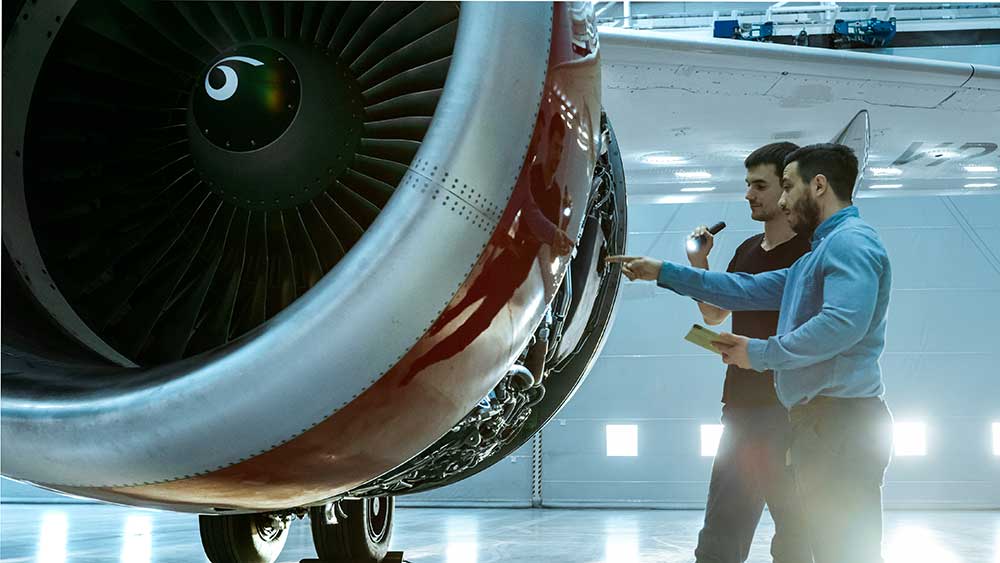The Sky’s the Limit in Aerospace Engineering
Aerospace engineering, a field that has been at the forefront of technological advancement and human achievement, is a testament to the limitless potential of human ingenuity. From the design of aircraft that traverse our skies to spacecraft that venture into the vast expanse of the universe, aerospace engineers have been instrumental in pushing the boundaries of what’s possible.
The field of aerospace engineering is a blend of innovation, precision, and a relentless pursuit of knowledge. It’s a discipline that demands a deep understanding of physics, mathematics, and material science, coupled with a creative ability to solve complex problems. Aerospace engineers work on the cutting edge of technology, developing new aircraft and spacecraft designs, improving existing models, and finding solutions to the challenges of flight and space exploration.
In today’s world, the importance of aerospace engineering cannot be overstated. It plays a crucial role in various sectors, including defense, transportation, and space exploration. Aerospace engineers contribute to national security through the design of advanced defense systems, facilitate global connectivity through commercial aviation, and drive the exploration of space, the final frontier.
Into the World of Aerospace Engineering
Aerospace engineering is a specialized discipline that combines elements of mechanical, electrical, and computer engineering to design and develop aircraft, spacecraft, and their components. The field is typically divided into two main branches: aeronautical engineering, which focuses on aircraft that operate within the Earth’s atmosphere, and astronautical engineering, which is concerned with the design of spacecraft.
An aerospace engineer’s role is multifaceted and challenging. They are involved in the entire process of aircraft and spacecraft development, from the initial conceptual design stage to the testing of the final product. They must consider a multitude of factors, including aerodynamics, propulsion systems, structural design, materials, avionics, and stability and control mechanisms. Moreover, they need to ensure that all these elements work together seamlessly to create a safe, efficient, and effective aircraft or spacecraft.
The work of aerospace engineers has a profound impact on our daily lives and the world at large. They design commercial aircraft that transport millions of passengers around the globe, contributing to global connectivity and economic growth. They develop military aircraft and defense systems that protect nations. They design spacecraft that explore the mysteries of the universe, contributing to our understanding of the cosmos.
Aerospace engineers require a strong foundation in physics, mathematics, and engineering principles, along with a keen analytical mind and problem-solving skills. They must be able to work in teams, as aircraft and spacecraft development is typically a collaborative effort involving many different specialists. Furthermore, they need to stay abreast of technological advancements and industry trends, as the field of aerospace engineering is continually evolving.
A Glimpse into the Top 5 Aerospace Engineering Salaries
Aerospace engineering is a field that offers a wide range of career opportunities, each with its own unique challenges and rewards. Let’s take a closer look at the top 5 aerospace engineering jobs that offer the highest salaries.
Aerospace Program Manager Salary: These professionals oversee the planning, coordination, and execution of projects in the aerospace industry. They require a bachelor’s degree in aerospace engineering or a related field, several years of experience, and strong leadership and project management skills. The average salary for an Aerospace Program Manager is around $135,000 annually, and the job outlook is positive, with a projected growth rate of 3% from 2020 to 2030.
Aerospace Engineering Manager Salary: These individuals manage a team of aerospace engineers and oversee the design, development, and testing of aircraft and spacecraft. They need a bachelor’s degree in aerospace engineering, several years of experience, and strong leadership and strategic planning skills. The average salary for an Aerospace Engineering Manager is approximately $130,000 annually, with a job outlook growth rate of 3% from 2020 to 2030.
Senior Aerospace Engineer Salary: Senior Aerospace Engineers are responsible for designing and developing aircraft and spacecraft, and often mentor junior engineers. They require a bachelor’s degree in aerospace engineering and several years of experience in the field. The average salary for a Senior Aerospace Engineer is around $115,000 annually, and the job outlook is positive, with a projected growth rate of 3% from 2020 to 2030.
Aerospace Systems Engineer Salary: These professionals design and manage complex aerospace systems over their life cycles. They need a bachelor’s degree in aerospace engineering or a related field, and strong systems engineering skills. The average salary for an Aerospace Systems Engineer is approximately $110,000 annually, with a job outlook growth rate of 3% from 2020 to 2030.
Aerospace Design Engineer Salary: Aerospace Design Engineers are responsible for designing aircraft and spacecraft, ensuring they meet all safety and performance standards. They require a bachelor’s degree in aerospace engineering and strong design skills. The average salary for an Aerospace Design Engineer is around $105,000 annually, and the job outlook is positive, with a projected growth rate of 3% from 2020 to 2030.
These roles represent the top tier of aerospace engineering in terms of salary. However, it’s important to remember that a career in aerospace engineering is not just about the financial rewards. It’s about the opportunity to contribute to a field that’s at the forefront of technological advancement and human achievement.
Venturing into the Future of Aerospace Engineering Jobs
The field of aerospace engineering is one that is constantly evolving, driven by technological advancements and the ever-present human desire to explore and understand the universe. As we venture into the future, the landscape of aerospace engineering jobs is expected to change, influenced by several key trends.
One of the most significant trends is the increasing focus on sustainability in aerospace engineering. As concerns about climate change and environmental impact continue to grow, aerospace engineers are being challenged to design aircraft and spacecraft that are more fuel-efficient and produce fewer emissions. This is likely to lead to an increase in demand for aerospace engineers who specialize in green technologies and sustainable design.
Another trend is the growing interest in commercial space travel. With companies like SpaceX and Blue Origin making headlines with their ambitious plans for space tourism, there is likely to be a growing need for aerospace engineers who can contribute to the development of safe and reliable spacecraft for commercial use.
The rise of unmanned aerial vehicles, or drones, is another trend that is likely to influence the future of aerospace engineering jobs. Drones are being used in a wide range of applications, from delivery services to disaster response, and this is expected to create new opportunities for aerospace engineers who specialize in drone technology.
The increasing reliance on satellites for communication, navigation, and earth observation is another trend that is expected to drive demand for aerospace engineers. As more and more satellites are launched into space, there will be a need for engineers who can design and maintain these complex systems.
In terms of job outlook, the U.S. Bureau of Labor Statistics predicts a growth rate of 3% for aerospace engineering jobs from 2020 to 2030. While this is about as fast as the average for all occupations, certain specialties within aerospace engineering, such as those mentioned above, may experience faster growth.
Ascending to New Heights in Aerospace Engineering
A career in aerospace engineering is not just about acquiring the right qualifications and landing a high-paying job. It’s about continuous learning, staying updated with the latest industry trends, and constantly striving to enhance your skills and knowledge. In this section, we’ll explore some strategies that can help you boost your earnings and ascend to new heights in your aerospace engineering career.
Firstly, consider pursuing advanced degrees or certifications in aerospace engineering or related fields. While a bachelor’s degree is the minimum requirement for most aerospace engineering jobs, having a master’s degree or a PhD can open up opportunities for higher-level positions and increase your earning potential. Certifications in specific areas of aerospace engineering, such as systems engineering or project management, can also enhance your credentials and make you more attractive to employers.
Secondly, keep abreast of the latest technological advancements in the field. Aerospace engineering is a rapidly evolving discipline, and staying updated with the latest technologies and trends can give you a competitive edge. This could involve learning about new materials, software, or design techniques, or staying informed about the latest research in aerospace engineering.
Thirdly, develop your soft skills. While technical skills are undoubtedly important in aerospace engineering, soft skills such as communication, teamwork, and problem-solving are also crucial. These skills can help you work effectively in teams, communicate your ideas clearly, and solve complex problems, all of which can enhance your performance and increase your value to employers.
Lastly, consider specializing in a niche area of aerospace engineering. As we discussed in the previous section, there are several emerging trends in aerospace engineering, such as sustainability, commercial space travel, drone technology, and satellite systems. Specializing in one of these areas could make you more sought after and increase your earning potential.
Beyond the Salary – The True Value of Aerospace Engineering
While the financial rewards of a career in aerospace engineering are certainly appealing, it’s important to remember that the true value of this profession lies far beyond the paycheck. Aerospace engineering is a field that offers immense personal and professional satisfaction, providing opportunities to contribute to technological advancements, solve complex problems, and even shape the future of humanity.
Aerospace engineers play a pivotal role in pushing the boundaries of what’s possible. They design and develop aircraft and spacecraft that enable us to explore the skies and venture into the vast expanse of space. They work on the cutting edge of technology, constantly innovating and creating solutions to some of the most challenging problems. The work they do has a profound impact on our world, from facilitating global connectivity and contributing to national security, to driving the exploration of space and enhancing our understanding of the universe.
Moreover, aerospace engineering is a field that offers endless opportunities for learning and growth. It’s a discipline that constantly evolves, driven by technological advancements and the ever-present human desire to explore and understand. As an aerospace engineer, you’ll never stop learning. You’ll continually acquire new skills, enhance your knowledge, and adapt to the changing landscape of the field.
In addition, aerospace engineering offers the opportunity to be part of a global community of scientists, engineers, and innovators who share a common goal – to explore, understand, and innovate. You’ll have the chance to collaborate with some of the brightest minds in the field, work on exciting and challenging projects, and contribute to a body of knowledge that spans the globe and reaches out into the cosmos.
Charting Your Course in Aerospace Engineering
As we’ve explored throughout this blog post, aerospace engineering is a dynamic and rewarding field, offering a variety of high-paying jobs and the opportunity to contribute to technological advancements that shape our world and beyond. But how can you chart your course in this exciting field? Here are some key steps to consider.
Education is the foundation. Pursuing a bachelor’s degree in aerospace engineering or a related field is the first step. This will provide you with the fundamental knowledge and skills needed to enter the field. Some universities also offer specialized programs in areas like aeronautics, astronautics, or even specific aspects of aerospace technology, which can provide a more focused education.
Consider internships or cooperative programs while you’re still in school. These opportunities can provide invaluable hands-on experience, allowing you to apply what you’ve learned in the classroom to real-world scenarios. They can also help you establish professional connections and could potentially lead to job opportunities after graduation.
Once you’ve entered the field, never stop learning. As we’ve discussed, aerospace engineering is a rapidly evolving field. Staying abreast of the latest technologies, research, and trends is crucial. This could involve pursuing advanced degrees, obtaining professional certifications, attending industry conferences, or even just reading industry journals and publications.
Find your niche. Aerospace engineering is a broad field with many sub-disciplines. Whether it’s designing aircraft, developing spacecraft, working on satellite technology, or any of the other myriad possibilities, find the area that most interests you and make it your specialty.
Lastly, remember the importance of soft skills. While technical knowledge and skills are crucial in aerospace engineering, soft skills like communication, teamwork, and problem-solving are equally important. These skills will help you work effectively in teams, present your ideas clearly, and navigate the challenges that come your way.
| Job Title | Brief Job Description | Required Qualifications and Skills | Average Salary | Job Outlook |
| Aerospace Project Engineer | Oversee technical aspects of aerospace projects, coordinate teams, ensure project completion within budget and timeline | Bachelor’s degree in Aerospace Engineering, Project Management skills | $116,500 | Positive |
| Aerospace Systems Engineer | Design and develop systems for aircraft and spacecraft, ensure system reliability and efficiency | Bachelor’s degree in Aerospace Engineering, Systems Engineering skills | $120,000 | Positive |
| Aerospace Engineering Manager | Oversee teams of engineers, manage projects, coordinate with other departments | Bachelor’s degree in Aerospace Engineering, Management skills | $130,000 | Positive |
| Aerospace Director | Oversee all aspects of aerospace projects, make strategic decisions, coordinate with stakeholders | Bachelor’s degree in Aerospace Engineering, Leadership skills | $150,000 | Positive |
| Chief Aerospace Engineer | Oversee all engineering activities, make high-level decisions, ensure product quality and safety | Bachelor’s degree in Aerospace Engineering, Leadership skills, Extensive experience | $170,000 | Positive |





